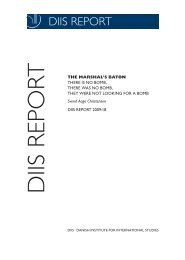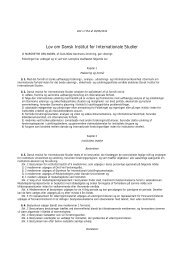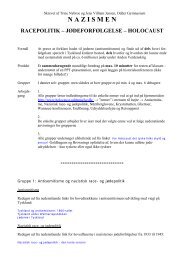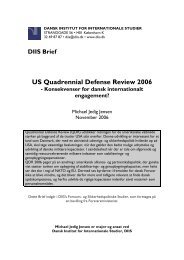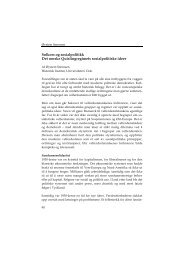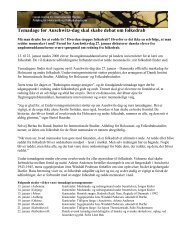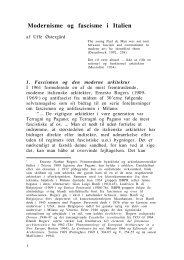Flugten til Sverige. Aktionen mod de danske jøder oktober 1943 - DIIS
Flugten til Sverige. Aktionen mod de danske jøder oktober 1943 - DIIS
Flugten til Sverige. Aktionen mod de danske jøder oktober 1943 - DIIS
Create successful ePaper yourself
Turn your PDF publications into a flip-book with our unique Google optimized e-Paper software.
sted by the Germans in October. The guards not only drew the line at merely<br />
turning a blind eye to the evacuation, in many cases they helped the Jews and<br />
took an active part in the organisation of the transports. This gave the illegal<br />
crossings an air of legality and encouraged many other volunteers to offer their<br />
help. Another contributory factor was the particular treatment given to the<br />
volunteers who were arrested. Thus, the German authorities accepted the Danish<br />
authorities’ mild treatment of those caught and it therefore also seems very likely<br />
that many volunteers became aware that helping the Jews to Swe<strong>de</strong>n carried a<br />
very small risk. Unlike the situation in other occupying<br />
countries, they did not risk their lives. It was quite simply not consi<strong>de</strong>red to be a<br />
serious offence. The maximum penalty was three months’ imprisonment, but<br />
many got off more lightly or were not<br />
punished at all.The timing of the action was also a <strong>de</strong>cisive factor for the massive<br />
rescue mission. It was carried out at a time when the policy of collaboration had<br />
en<strong>de</strong>d and the hos<strong>til</strong>ity towards the occupying forces was mounting, which<br />
meant that the Jews received the support and help which they nee<strong>de</strong>d. The<br />
assistance offered by the Danish coastal and naval police forces during the mass<br />
exodus followed the collapse on 29th August. Had the action against the Jews<br />
been launched in, for instance, 1942, the result would probably have been a<br />
different one. The Danes would have been more reluctant to offer their help, and<br />
Swe<strong>de</strong>n, guarding its neutrality, would have been unlikely to receive several<br />
thousand Jews.The most important factor behind the success of the Jewish mass<br />
exodus was, however, the fact that the Germans did not carry out a systematic<br />
hunt for the Jews following the action on 1st October. Even though the Germans<br />
were aware that the Danish coastal and naval police did not interfere with the<br />
Jewish exodus, the Germans only used a small number of their own officers. The<br />
German navy did not engage in police surveillance of the Sound in October. As a<br />
result not a single crossing out of the 600-700 ma<strong>de</strong> with Jewish refugees was<br />
halted on its way to Swe<strong>de</strong>n. The Wehrmacht could have stopped the escape of<br />
all those Jews. However, soldiers were only <strong>de</strong>ployed in a few cases following<br />
requests from the German security forces. Throughout the mass exodus 1,300-<br />
1,400 German uniformed policemen were stationed in Copenhagen. Had this<br />
efficient force been in




